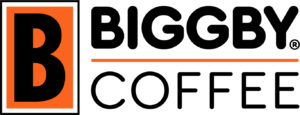Categories
- Show All
- Bean Basics
- Build a Life You Love
- Company News
- Franchise Development
- One BIGG Island in Space
- Promotions
Biggby Coffee Finds its Happy Place
Category: Uncategorized
If nothing else, Michael McFall and his cohorts at Biggby Coffee can take a hint.
Though the business launched in 1995 with a simple plan that involved building coffee shops and expanding within the everyday constraints of margins and revenue, it was soon apparent that outside demand for a piece of that concept exceeded the anticipated supply.
“We had two stores and we started to get phone calls – a material number of phone calls – saying ‘Are you guys franchising? If so, I’d love to talk to you,’” says McFall, the company’s president.
“We were getting enough of these calls that we ended up settling on the idea that this would be a nice avenue, a nice method to grow.”
Biggby did that from the time it began franchising in 1999 through 2006, by which time its corporate footprint stretched well past its single-store beginnings in Lansing and East Lansing, Mich. Still, it took an outside observation to sharpen the approach to the one that’s far surpassed those early advances.
“We had some pretty intense meetings with Fred DeLuca (co-founder of Subway), it ended up being a year-long conversation, and he ended up advising us that we needed to choose one or the other,” McFall says. “We needed to have corporate-owned stores or franchises, because, in his estimation, we weren’t doing either one of them as well as we could have.”
The Biggby team digested the counsel and chose its path, selling all its owned stores and committing completely to the franchise concept – which, by late 2011, earned it recognition from CNBC as the fastest-growing coffee chain in the United States. It has since swelled to more 200 finished or planned locations in nine states and has doubled its number of total units every two years since 2000.
Corporate revenue in 2006 was $20 million. By the end of 2013, it was just shy of $70 million.
The cable network used data from Chicago-based Technomic Inc. and determined that the growth rate outpaced that of larger competitors Starbucks and Dunkin Donuts.
The short-term growth goal going forward, according to CEO Bob Fish, is 300 stores by 2015.
“There are two different camps within franchising,” McFall says, “whether it’s good to have corporate-owned stores or not. Right now, we’re very, very comfortable with the way we’re developing our company. We may very well get back into owning our own stores, but at that time we’d simply be a franchisee of our own business. We never intended to do it this way, but it’s worked very well.”
Though the vast majority of Biggby’s stores are in its home state or adjacent neighbors Indiana, Illinois and Wisconsin, the franchise model has enabled extension into much farther-flung areas like Texas, South Carolina, Kentucky and Florida. And while McFall insists world takeover is not on the agenda, confidence exists that simply adhering to the systems the company has in place for franchisees will allow the operation to succeed anywhere.
“We want someone who has a passion for operating, who is enthusiastic and engaged,” he says. “It’s an engaged investment, a full-time occupation. And we believe we can take just about anybody and turn them into an effective operator.”
Prospective franchisees go through six weeks of classroom and on-site training with the corporate operations staff, all of which must be completed before a location is opened. Once a store is opened, the company provides access to an online Franchise Resource Center and follows through with in-store inspections, customer surveys and mystery shopper procedures that protect the brand.
All franchising inquiries thus far have come to Biggby’s from the outside in, though the company does hold twice-monthly “Discovery Days” at its headquarters to introduce the concept to interested parties. No prototype exists for the ideal franchisee, McFall says, and no previous restaurant experience is required for prospective owners, so long as they meet baseline financial requirements that include $70,000 in equity available equity and $150,000 in net worth.
In the big picture, coffee shops make up the fastest-growing segment of the restaurant business, according to the 2012 Coffee Statistics Report, and specialty coffee shops account for one-third of a $40 billion coffee industry in the U.S., where 400 million cups are consumed daily and 146 billion annually.
“We focus on being the best coffee shop in any given market that we’re in. That’s our priority. Whether it’s Starbucks or 7-Eleven or McDonalds, we’re competing with any place a person would stop for a coffee on the way to work.” he says. “We don’t have a massive national rollout strategy or anything like that. We are simply executing here in our own backyard and doing some business in a few other places.
“If we do a good job with that then we believe we’ll be able to expand more aggressively.”
——–
AT A GLANCE
WHO: Biggby Coffee
WHAT: Specialty coffee chain founded in 1995 that offers beverages, meals and snacks in each location, and is available to cater meetings, office parties or family events.
WHERE: Founded in East Lansing, Mich., now has 200 actual or planned stores in nine states and expects to reach 300 by the end of 2015.
RECOGNITION: 90.4 percent of Facebook reviewers, 3,244 of 3,588, rated the company with either four of five stars (out of a possible five).
Original article: http://www.businessworld-magazine.com/business-world-magazine/february-2014/biggby-coffee/



